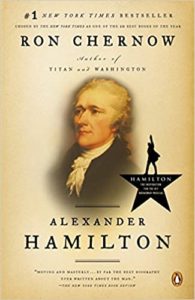BY CORTNEY MORSE DOUCETTE
VIRGINIA BEACH — Alexander Hamilton, Ron Chernow’s 2004 biography of the Founding Father, is a must read for American history enthusiasts, particularly those who may have overlooked this giant of the American finance system while he stood in the shadow cast by our own Virginian agrarian idealist, Thomas Jefferson.
Fans of the Broadway musical based on the book will marvel at the near direct transference of information from the page to the stage.
Readers are introduced to Hamilton as an illegitimate son born on the island of Nevis in the British West Indies. It is hard to overstate his inauspicious beginnings as tragedy surrounded his impoverished early life, including his abandonment by his father, the death of his mother by disease followed by the suicide of his guardian.
Hamilton was largely self-taught, but by virtue of grit and intellect he persevered as a clerk on the Caribbean island of St. Croix, where he found himself when a hurricane ripped through on Aug. 31, 1772.
A letter he wrote describing the storm was published in a local paper, and Hamilton’s writing was so stirring that a subscription was taken up to send him to America to be educated. He was 17. At the end of that year, Hamilton sailed to Boston and immediately made his way to New York.
Chernow takes us through Hamilton’s studies at Kings College, now Columbia University, to his participation in the early days of the Revolution. In early 1777, George Washington invited Hamilton to be his aide-de-camp, affording Hamilton a front row seat to the leadership of Washington through the war and Washington’s years as the first president of the young country.
Their relationship would prove pivotal to Hamilton’s meteoric rise in the formation of the U.S. government.
Hamilton was instrumental in creating the mechanisms that keep the engines of American democracy running. Hamilton’s exertions on the battlefield during the revolution, defense of the Constitution via The Federalist, innovations in the formation of the banking system, and advocacy for a strong executive branch are all detailed in this highly readable and informative work. All are relayed with keen insight and context.
Many details of the internecine political fights – particularly the savageness displayed pseudonymously in the newspapers of the day by Hamilton and his nemesis, Thomas Jefferson – are a sobering reminder that the recent years of partisan rancor are no new addition to the American experiment.
Doucette is a senior marketing manager for a technology company.
© 2020 Pungo Publishing Co., LLC



